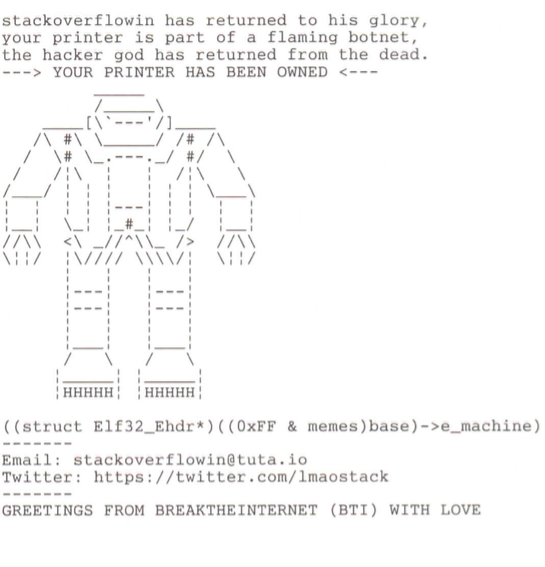Printing outs sent Printers open on the Internet
Third party cloud security comes into question after CloudFlare, a popular content delivery network used by more than 5.5 million sites, accidentally leaked customers' sensitive information for months. If you are a CloudFlare customer I strongly advise to change your passwords. The Yahoo’s sale to Verizon has dropped by $350m following Yahoo’s recently reported data breaches. And Sports Direct came in for criticism for not advising its 30,000 staff that their personal details had been hacked.
Back on the technical security front, Google researchers illustrated security weakness in SHA-1. The cryptographic hashing algorithm has not been considered secure since 2010, so the research is a poignant reminder to never use SHA-1 on new configurations, and to review and phase all SHA-1 usage in any existing solutions, such as site-to-site VPNs and within application development, go for SHA-256 or SHA-3 hashing instead.
Back on the technical security front, Google researchers illustrated security weakness in SHA-1. The cryptographic hashing algorithm has not been considered secure since 2010, so the research is a poignant reminder to never use SHA-1 on new configurations, and to review and phase all SHA-1 usage in any existing solutions, such as site-to-site VPNs and within application development, go for SHA-256 or SHA-3 hashing instead.
News
- Major CloudFlare Bug Leaked Sensitive Data from Customers’ Websites
- Verizon Yahoo Deal at Lower Price after Hacks
- Sports Direct 'hid data breach from Staff'
- Google Research Cracks SHA-1 (Cryptographic Hashing Algorithm)
- 40,000 WordPress blogs defaced in Hack Attacks
- Hack of Aberdeen City Council website cost the local authority £10,000
- London Hospital fined £200,000 over fertility Data Breach
- Script-Kiddie Hacker Hijacks Printers through insecure Firewalls
- UK firms 'chronically understaffed' in face of Cyber Threat
- Microsoft release 1 Critical Patch for Adobe Flash Player
- Google reveals bug prior to Microsoft patch
- Only 1.2% of Android devices use latest OS

you share a good post, very informative and important topic.This post very creatively formed the informations about the Cyber Security.I really admire your work and i hope in future i will return for more info. like this one.
ReplyDeleteThank you very much for sharing security roundup that will make me able to get best knowledge about the things that I did not know before.
ReplyDelete